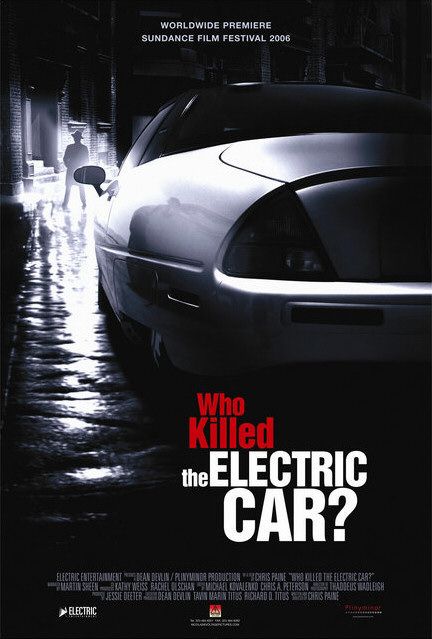“Discussing the Future in Light of the Past”

| None | Light | Moderate | Heavy | |
|---|---|---|---|---|
| Language | ||||
| Violence | ||||
| Sex | ||||
| Nudity |
What You Need To Know:
WHO KILLED THE ELECTRIC CAR? makes some good points in favor of hybrid electric cars. The movie’s occasionally partisan, liberal politics and biased use of factual evidence undermine its effectiveness and require a caution. However, the movie quotes one former bureaucrat at the end who suggests Evangelical Christians and more conservative Americans can be part of a broad coalition supporting fuel-efficient electric cars. Of course, people should be equally skeptical of the oil industry and those politicians, including President Bush, who seem to promote other energy technology at the expense of electric car technology.
Content:
(B, E, PC, C, L, V, M) Slight overall moral worldview expresses some environmentalist concerns (including a couple mentions of controversial, somewhat shaky “Global Warming” theory) but also expresses concerns about saving gas in this age of higher gas prices and war in the Middle East, plus politically correct content that occasionally seems to unfairly slam Republicans and conservatives without mentioning the valid philosophical concerns they may have, and man drives electric car with sign “What would Jesus drive?” and former bureaucrat suggests near the end Evangelical Christians and more conservative Americans now can be part of a broad coalition supporting fuel-efficient electric cars; two “H” words, two or three “s” words and one “godforsaken”; brief image of explosion in Iraq War in one shot; no sex; no nudity; no alcohol; no smoking; and, partisan attitude seems to leave out some important facts and arguments.
More Detail:
The movie opens with a funeral held by some environmentalists for the electric car that General Motors stopped making in the early part of this century. The movie then documents the history of the electric car program by General Motors, Toyota and Honda, among other automakers. Besides engineers and experts, the movie quotes those involved in the program, especially GM officials and workers, as well as electric car owners, including famous people like Mel Gibson and Tom Hanks. Eventually, it blames the car companies, the oil companies and politicians, especially a California clean air official and President Ronald Reagan and President Bush One and Two, for helping to kill the electric car mandates by the state of California that effectively killed the electric car. It also attacks the current Bush administration for promoting hydrogen fuel cell cars, a technology that seems to be years in the future, if not a couple decades. The movie points out that Bush’s former chief of staff, Andy Card, was head of the auto manufacturers association that argued against the California mandates back in the 1990s.
WHO KILLED THE ELECTRIC CAR? makes some good points in favor of hybrid electric cars and future hybrid cars that may have a plug-in electric feature. Apparently, however, more than a few experts disagree that cars running on hydrogen fuel cells are so bad as this movie makes out. In fact, the movie only keeps citing one hydrogen fuel cell expert who seems to support the movie’s argument in favor of electric technology over hydrogen technology. The movie never gives the California clean air official, himself an expert on hydrogen fuel cells, much of a chance to refute the facts cited by the movie’s favored hydrogen expert.
Be that as it may, the movie attacks conservative politicians who don’t like putting government mandates on car manufacturers and oil companies. The movie doesn’t mention the fact that conservatives prefer economic incentives rather than liberal mandates, especially complicated mandates that hurt businesses or the economy. This preference easily explains conservative opposition, including that of Andrew Card, against the California mandate. Of course, with today’s crises in the Middle East and in gasoline prices, government is now faced with situations that cry out for many more incentives for such things as electric cars.
In that light, the movie argues quite effectively that American politicians have failed to provide enough incentives for weaning Americans away from gas-guzzling cars. That said, the Clinton-Gore administration seems to have failed as much as recent Republican, allegedly conservative administrations, so why doesn’t the documentary attack President Bill Clinton and Vice President Al Gore as much as the current Bush administration?
Finally, the movie conveniently leaves out the apparent fact that GM’s electric car did not live up to then-current safety standards. Because of this, the government mandated that GM take back its leased cars after three years, which is exactly what the company did! Also, the movie doesn’t say much about the fact that GM’s car was only a two-seater, something which doesn’t fit in with the American lifestyle, especially the lifestyle of many families, the primary consumers of automobiles. Instead, the movie contends that GM officials were lying and deceiving people when they claimed that there was not enough demand for their electric car.
Leaving out important facts and arguments, and unfairly bashing one side (especially when both sides may share some blame), is a regrettable tendency among people with a left-wing, politically correct agenda. This environmentalist documentary would have been better if it had been less interested in bashing its political opponents and companies like GM and more interested in fairly presenting both sides. Thus, although this movie does show President Bush lamenting Americans’ addiction to oil, moviegoers should approach it with some caution. Plug-in hybrid cars do seem like a major solution to the gas crisis and America’s dependence on foreign oil, but people should examine the issue more fully before they buy into everything this documentary has to say. Of course, people should be equally skeptical of the hydrogen fuel cell lobby and politicians, like President Bush and the oil industry, who promote hydrogen technology at the expense of the electric hybrids using special batteries.
It should be noted that Chris Paine, this movie’s director, worked in the radical “Nuclear Freeze” movement during the 1980s. That left-wing movement did much to delay the dismantling of the brutal Communist system in the Soviet Union that President Ronald Reagan and British Prime Minister Margaret Thatcher opposed so courageously. The “Nuclear Freeze” movement was filled with Communist stooges who hate capitalism and the countless benefits it undeniably brings to the vast majority of people. Being fair to corporations like GM and conservative politicians like President Reagan is not part of their politically correct Neo-Marxist agenda.


 - Content:
- Content: 





